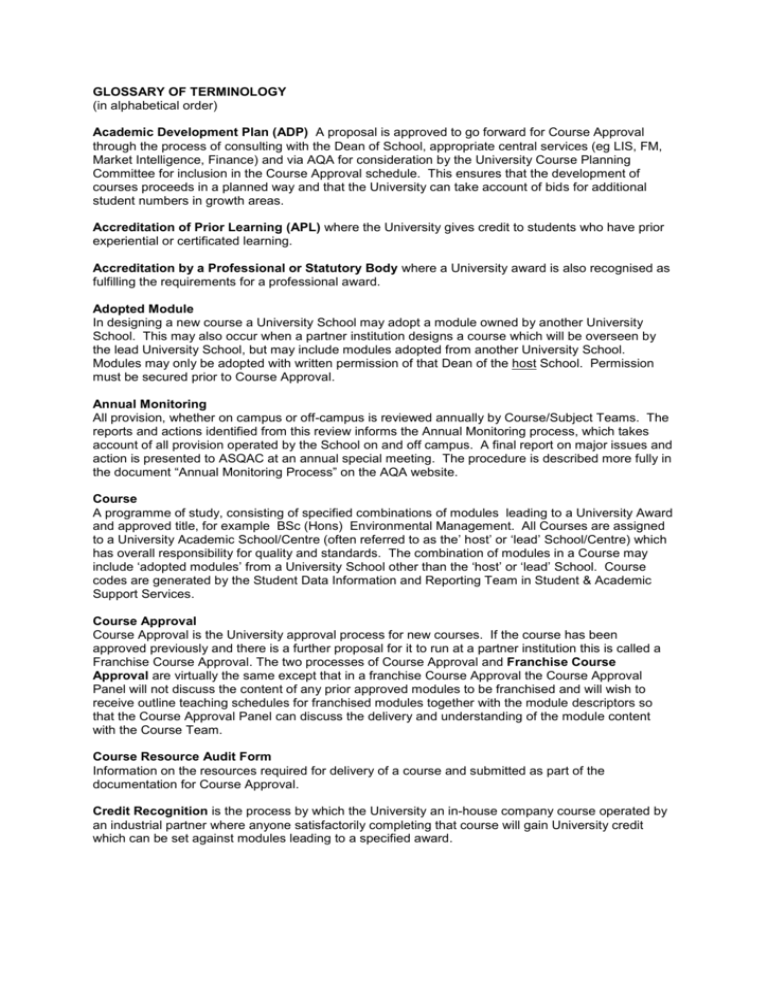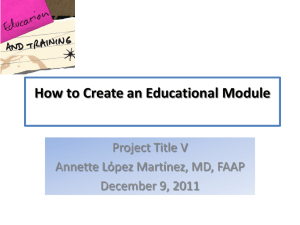Course Developers Guide
advertisement

GLOSSARY OF TERMINOLOGY (in alphabetical order) Academic Development Plan (ADP) A proposal is approved to go forward for Course Approval through the process of consulting with the Dean of School, appropriate central services (eg LIS, FM, Market Intelligence, Finance) and via AQA for consideration by the University Course Planning Committee for inclusion in the Course Approval schedule. This ensures that the development of courses proceeds in a planned way and that the University can take account of bids for additional student numbers in growth areas. Accreditation of Prior Learning (APL) where the University gives credit to students who have prior experiential or certificated learning. Accreditation by a Professional or Statutory Body where a University award is also recognised as fulfilling the requirements for a professional award. Adopted Module In designing a new course a University School may adopt a module owned by another University School. This may also occur when a partner institution designs a course which will be overseen by the lead University School, but may include modules adopted from another University School. Modules may only be adopted with written permission of that Dean of the host School. Permission must be secured prior to Course Approval. Annual Monitoring All provision, whether on campus or off-campus is reviewed annually by Course/Subject Teams. The reports and actions identified from this review informs the Annual Monitoring process, which takes account of all provision operated by the School on and off campus. A final report on major issues and action is presented to ASQAC at an annual special meeting. The procedure is described more fully in the document “Annual Monitoring Process” on the AQA website. Course A programme of study, consisting of specified combinations of modules leading to a University Award and approved title, for example BSc (Hons) Environmental Management. All Courses are assigned to a University Academic School/Centre (often referred to as the’ host’ or ‘lead’ School/Centre) which has overall responsibility for quality and standards. The combination of modules in a Course may include ‘adopted modules’ from a University School other than the ‘host’ or ‘lead’ School. Course codes are generated by the Student Data Information and Reporting Team in Student & Academic Support Services. Course Approval Course Approval is the University approval process for new courses. If the course has been approved previously and there is a further proposal for it to run at a partner institution this is called a Franchise Course Approval. The two processes of Course Approval and Franchise Course Approval are virtually the same except that in a franchise Course Approval the Course Approval Panel will not discuss the content of any prior approved modules to be franchised and will wish to receive outline teaching schedules for franchised modules together with the module descriptors so that the Course Approval Panel can discuss the delivery and understanding of the module content with the Course Team. Course Resource Audit Form Information on the resources required for delivery of a course and submitted as part of the documentation for Course Approval. Credit Recognition is the process by which the University an in-house company course operated by an industrial partner where anyone satisfactorily completing that course will gain University credit which can be set against modules leading to a specified award. Distance learning The majority of the student's learning activities take place at a distance from the academic institution (in QAA terms this term has now been officially replaced by flexible and distributed learning – see below) ELearn eLearn was UCLan’s name for the on-line Virtual Learning Environment (VLE). Blackboard is the name of the software used for eLearn from 2012 onwards. UCLan’s range of online services is now available under the new name of MyUCLan, which is the University’s online learning and portal environment. Flexible and Distributed Learning (formerly Distance Learning) The majority of the student's learning activities take place at a distance from the academic institution and includes the following learning methodologies: Blended learning (also called mixed-mode or hybrid learning) This is where traditional forms of teaching and learning (i.e., classrooms, books, etc.) are used in conjunction with e-learning to deliver the full student experience. (Sometimes called with slight tongue-in-cheek the bricks 'n' clicks approach.) Distributed learning Distributed learning is a model in which the instructor, students and content can all be located in different, noncentralised locations, so learning can occur independent of place and time. E-learning The HEFCE e-learning strategy of March 2005 (paragraph 20) describes this is any learning that uses ICT, as a communications and delivery tool, to support students, or improve the management of learning. E-learning is basically any use of electronic technologies to deliver or support teaching and learning. This includes 'online learning' (which some people do use as synonymous with e-learning), but also includes the use of Powerpoint and data projectors, or even e-mail and SYD! The University's choice platform for delivering e-learning is Blackboard. See also E-Learn. To go beyond these, paragraphs 23&24 (pp. 6&7) in the QAA Code of Practice Section 2 are helpful in making sense of 'flexible and distributed learning'. http://www.qaa.ac.uk/Publications/InformationAndGuidance/Pages/Code-of-practice-section-2.aspx (NB The Academic Infrastructure is being replaced by the UK Quality Code for Higher Education. This may therefore be superseded by new Quality Code material.) Franchised Module A new course designed by a partner college could contain modules franchised from University Schools. This is particularly useful to provide progression opportunities. These modules may come from the University School which will assume quality assurance responsibility for the course (the lead School) or they could be modules adopted from another University School. Franchise of adopted modules needs the written permission of the Dean of School which owns the modules. Permission must be secured prior to Course Approval. Franchising Franchising is a general term used to describe a situation where a complete course or module designed and approved by the University is subsequently approved for operation by a partner. Franchised Course. This is a University designed Course delivered at a partner institution. In a franchised course most of the modules are likely to be franchised, however the course could contain some new modules designed by the partner which may need to be validated. Schools generate codes for new modules. See also Course Approval. Host School and Lead School All University courses are allocated to a School for quality assurance purposes normally referred to as the ‘host’ School. Where a course operates solely at a partner institution, the term ‘lead’ School may be used for the University School which oversees the quality assurance aspects of the provision. Market Research This term is used to cover the process of identifying the student market and how the student market can be recruited. Module A module is a self-contained block of learning with separate aims and defined learning outcomes. All modules are assigned to University Academic Schools/Centres. (For full description see Academic Regulation C2). Each module has an alphabetical and numerical code. The alphabetical code identifies the University School/Centre (the host School/Centre) which is ultimately responsible for quality and standards. For collaborative provision, some modules are designed by and delivered only at partner institutions. Where this is the case the alphabetical code is specific to the University School/Centre and the partner. This system ensures that module results are channelled to the correct assessment board. Formerly the first digit of the numerical code indicated the academic level at which the module was delivered and assessed (eg BL1999 indicated level 1/year 1 of an undergraduate degree). In line with national renaming of levels the level is now indicated in a suffix eg BL1999 (L4) for first year undergraduates. Module codes are generated by the University Academic School/Centre. Module Descriptor The standard presentation of information on a Module. Network Provision This is where a network of providers collaborate to design a course to be delivered across the network. The course normally includes a common core with specialist options being available at particular sites. This may result in there being a generic title for the course with the specialism shown in brackets. Periodic Course Review (formerly Periodic Evaluation) This is the process through which courses are presented for review and re-Course Approval on a cycle of 5/6 years. In the case of overseas provision, courses are normally reviewed and re-validated on a five yearly cycle. Programme Specification The standard presentation of information on a course (or group of cognate courses), including the intended learning outcomes and the means by which these are achieved and demonstrated. QAA The Quality Assurance Agency for Higher Education is the external body funded by the Government to assess and report on quality and standards of Higher Education provision operated by UK institutions in the UK and overseas. Student Handbook A course handbook for students, with standard minimum contents as specified in the Course Developer’s Guide. Teaching Schedule This is required for franchised modules to provide information to the Course Approval Panel so that it can be ascertained whether there is equivalence with delivery at the University so that students studying the module at a partner institution are able to progress to the University. URP University Review Panel. There is a standing URP comprising academic and senior staff drawn from Schools, Central Services and Partner Institutions. The Chair and internal membership for individual Course Approval Panels is drawn from the URP and complemented by external advisors and, where available, a representative from the Student's Union.







